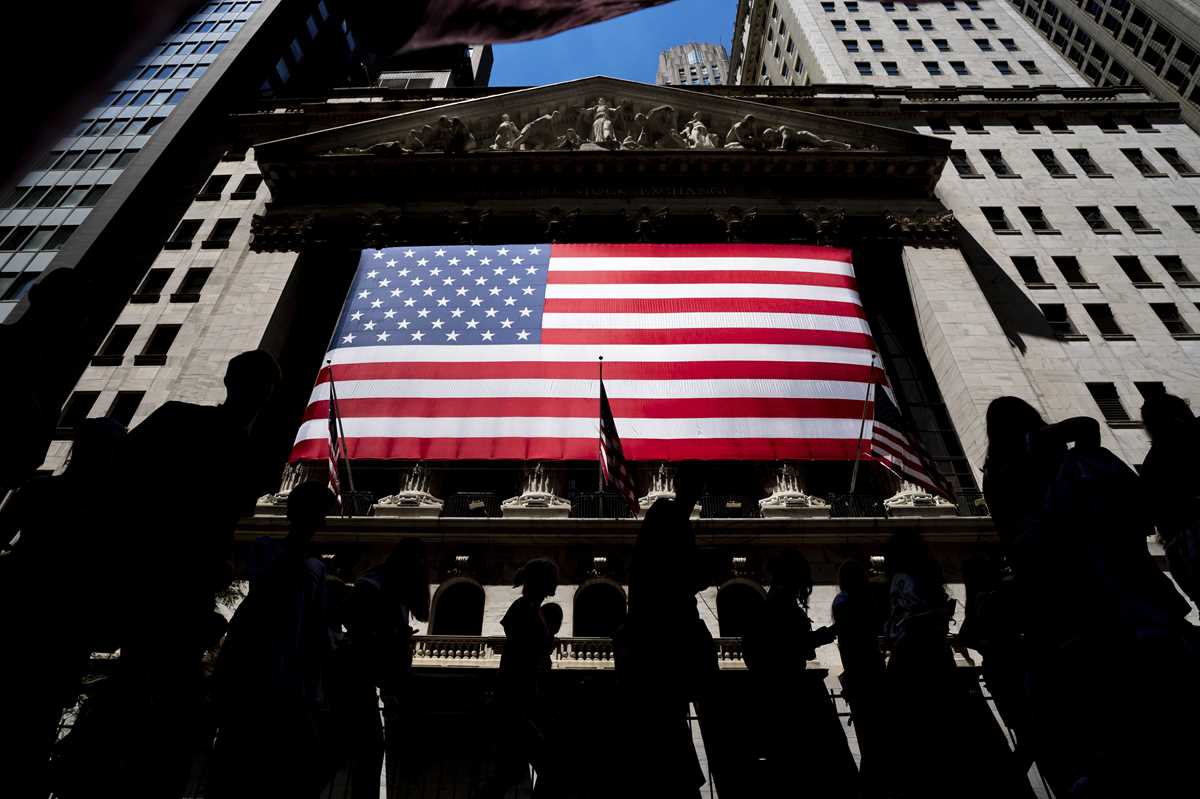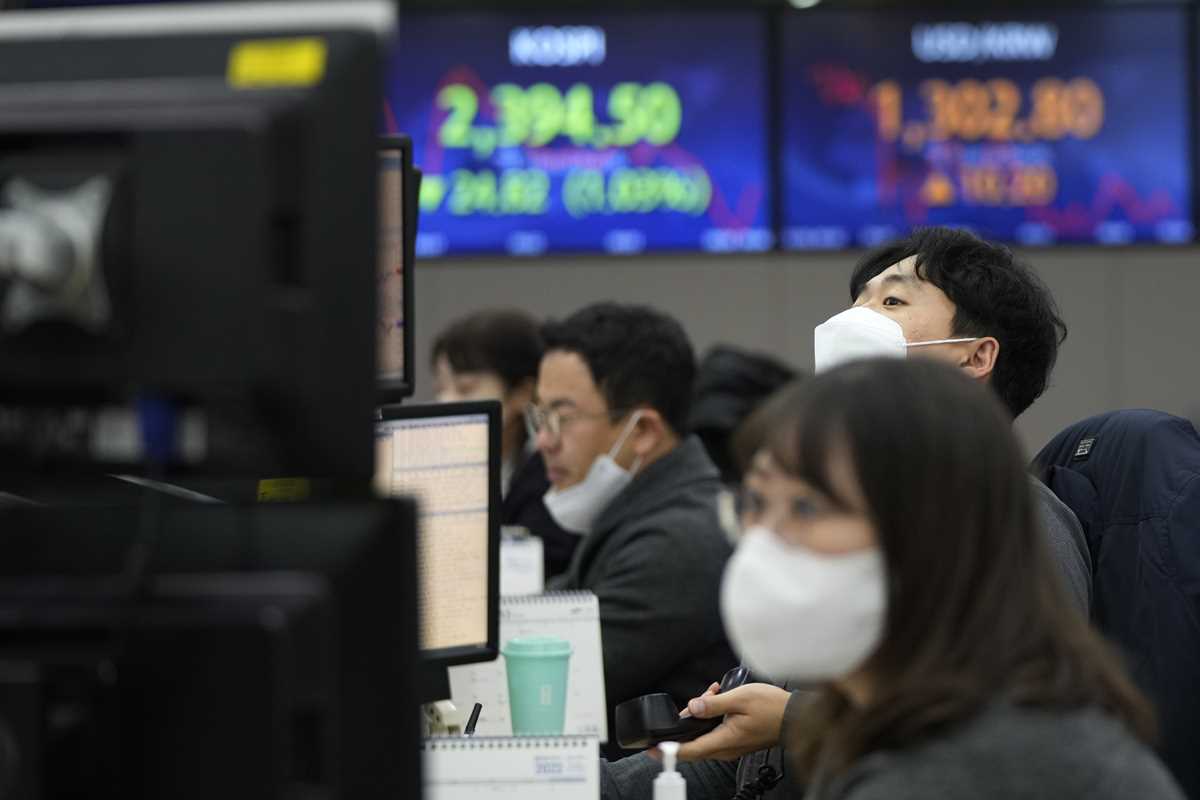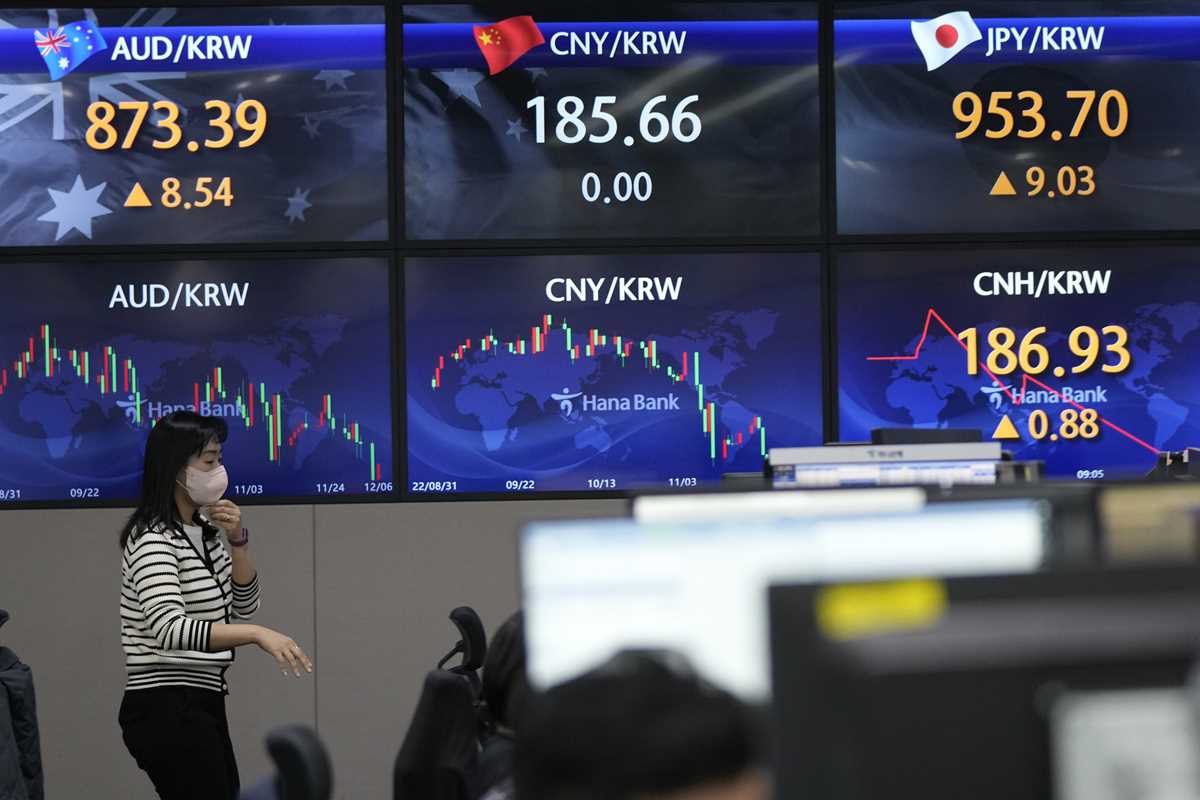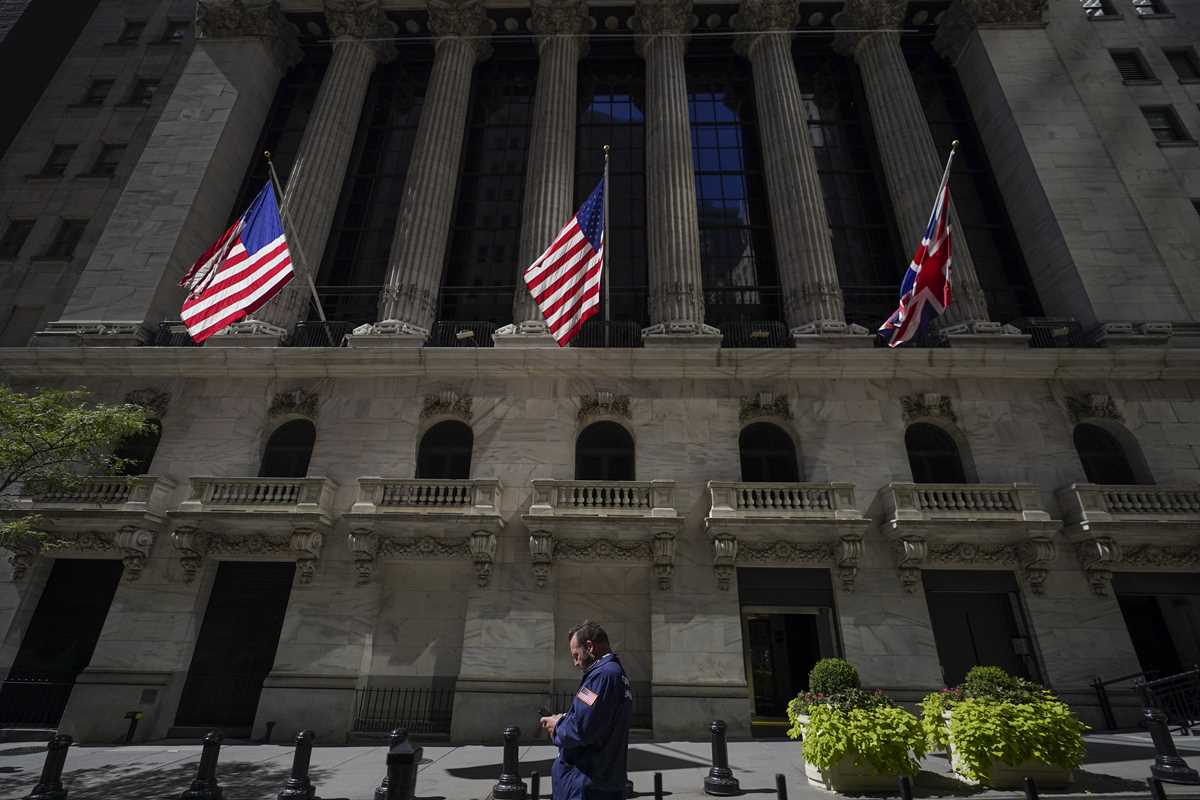 A currency trader passes by screens showing the Korea Composite Stock Price Index (KOSPI), left, and the exchange rate of South Korean won against the U.S. dollar at the foreign exchange dealing room of the KEB Hana Bank headquarters in Seoul, South Korea, Tuesday, Dec. 6, 2022. Stocks were mostly lower in Asia on Tuesday after Wall Street pulled back as surprisingly strong economic reports highlighted the difficulty of the Federal Reserve’s fight against inflation. (AP Photo/Ahn Young-joon)
A currency trader passes by screens showing the Korea Composite Stock Price Index (KOSPI), left, and the exchange rate of South Korean won against the U.S. dollar at the foreign exchange dealing room of the KEB Hana Bank headquarters in Seoul, South Korea, Tuesday, Dec. 6, 2022. Stocks were mostly lower in Asia on Tuesday after Wall Street pulled back as surprisingly strong economic reports highlighted the difficulty of the Federal Reserve’s fight against inflation. (AP Photo/Ahn Young-joon) A currency trader watches monitors at the foreign exchange dealing room of the KEB Hana Bank headquarters in Seoul, South Korea, Tuesday, Dec. 6, 2022. Stocks were mostly lower in Asia on Tuesday after Wall Street pulled back as surprisingly strong economic reports highlighted the difficulty of the Federal Reserve’s fight against inflation. (AP Photo/Ahn Young-joon)
A currency trader watches monitors at the foreign exchange dealing room of the KEB Hana Bank headquarters in Seoul, South Korea, Tuesday, Dec. 6, 2022. Stocks were mostly lower in Asia on Tuesday after Wall Street pulled back as surprisingly strong economic reports highlighted the difficulty of the Federal Reserve’s fight against inflation. (AP Photo/Ahn Young-joon) A currency trader passes by the screens showing the foreign exchange rates at the foreign exchange dealing room of the KEB Hana Bank headquarters in Seoul, South Korea, Tuesday, Dec. 6, 2022. Stocks were mostly lower in Asia on Tuesday after Wall Street pulled back as surprisingly strong economic reports highlighted the difficulty of the Federal Reserve’s fight against inflation. (AP Photo/Ahn Young-joon)
A currency trader passes by the screens showing the foreign exchange rates at the foreign exchange dealing room of the KEB Hana Bank headquarters in Seoul, South Korea, Tuesday, Dec. 6, 2022. Stocks were mostly lower in Asia on Tuesday after Wall Street pulled back as surprisingly strong economic reports highlighted the difficulty of the Federal Reserve’s fight against inflation. (AP Photo/Ahn Young-joon) A trader looks over his cell phone outside the New York Stock Exchange, Wednesday, Sept. 14, 2022, in the financial district of Manhattan in New York. (AP Photo/Mary Altaffer, File)
A trader looks over his cell phone outside the New York Stock Exchange, Wednesday, Sept. 14, 2022, in the financial district of Manhattan in New York. (AP Photo/Mary Altaffer, File) People walk past the New York Stock Exchange on Wednesday, June 29, 2022 in New York. Stocks are opening lower across the board on Wall Street, Tuesday, July 5, and crude oil prices are dropping again. Treasury yields also fell as traders continued to worry about the state of the economy (AP Photo/Julia Nikhinson)
People walk past the New York Stock Exchange on Wednesday, June 29, 2022 in New York. Stocks are opening lower across the board on Wall Street, Tuesday, July 5, and crude oil prices are dropping again. Treasury yields also fell as traders continued to worry about the state of the economy (AP Photo/Julia Nikhinson)Shares fell in Asia on Wednesday after Wall Street declined on fears the Federal Reserve will need to keep the brakes on the economy to get inflation under control, risking a sharp recession. Oil prices were mixed.
Tokyo's Nikkei 225 index slipped 0.6% to 27,727.53 and the Kospi in Seoul gave up 0.2% to 2,388.95. The Shanghai Composite lost 0.4% to 3,199.69, while Australia's S&P/ASX 200 dropped 0.6% to 7,245.20.
Hong Kong's Hang Seng index gained 0.2% to 19,469.46. Shares fell 0.2% in Mumbai but edged 0.1% higher in Bangkok.
China reported its imports and exports fell in November as global demand weakened and anti-virus controls weighed on the second-largest economy.
Customs data showed exports sank 9% from a year earlier, worsening from October’s 0.9% decline. Imports fell 10.9%, down from the previous month’s 0.7% retreat. Chinese trade had been forecast to weaken as global demand cooled following interest rate hikes by the Federal Reserve and central banks in Europe and Asia to rein in surging inflation.
On Tuesday, the S&P 500 fell 1.4%, its fourth straight loss, to 3,941.26 and the tech-heavy Nasdaq sank 2%, to 11,014.89.
The Dow Jones Industrial Average lost 1% to 33,596.34, while the Russell 2000 slipped 1.5% to 1,812.58.
Technology stocks, communication companies and retailers had some of the biggest losses. Apple fell 2.5%, Disney slid 3.8% and AutoZone dropped 2.8%.
Small company stocks also fell, pulling the Russell 2000 index 1.5% lower. The major indexes are on pace for a weekly loss after posting two straight weekly gains.
Bond yields fell. The yield on the 10-year Treasury slid to 3.52% from 3.58% late Monday.
Several companies made big moves following financial updates and buyout announcements.
Utility NRG Energy slumped 15.1% after announcing it is spending $2.8 billion in cash and assuming $2.4 billion in debt to buy Vivint Smart Home.
Jewelry company Signet vaulted 20.2% after raising its profit and revenue forecasts for the year.
The broader market's dip comes a day after stocks pulled back as stronger-than-expected readings on the economy raised worries that the Fed has a ways to go in getting inflation under control. The Fed is doing that by intentionally slowing the economy with higher interest rates.
Investors are closely watching economic data and company announcements to get a better sense of how the economy is handling stubbornly hot inflation. They are also trying to determine whether inflation is easing at a pace that will allow the Fed to ease up on interest rate increases. The Fed's policy risks hitting the brakes on the economy too hard and sending it into a recession.
The Fed is meeting next week and is expected to raise interest rates by a half-percentage point. It has raised its benchmark rate six times since March, driving it to a range of 3.75% to 4%, the highest in 15 years. Wall Street expects the benchmark rate to reach a peak range of 5% to 5.25% by the middle of 2023.
Wall Street will get a weekly update on unemployment claims on Thursday. The job market has been one of the stronger pockets in the economy.
On Friday, the government will release its November report on producer prices. That will give investors more insight into how inflation is impacting businesses.
The University of Michigan will release its December survey on consumer sentiment on Friday.
In other trading Wednesday, U.S. benchmark crude oil gained 1 cent to $74.26 per barrel in electronic trading on the New York Mercantile Exchange.
Brent crude oil, the international standard for pricing, gained 15 cents to $79.50 per barrel.
The dollar rose to 137.23 Japanese yen from 136.94 yen. The euro slipped to $1.0465 from $1.0468.
___
AP Business Writer Damian J. Troise contributed.
Before you make your next trade, you'll want to hear this.
MarketBeat keeps track of Wall Street's top-rated and best performing research analysts and the stocks they recommend to their clients on a daily basis.
Our team has identified the five stocks that top analysts are quietly whispering to their clients to buy now before the broader market catches on... and none of the big name stocks were on the list.
They believe these five stocks are the five best companies for investors to buy now...
See The Five Stocks Here
Click the link below and we'll send you MarketBeat's list of the 10 best stocks to own in 2024 and why they should be in your portfolio.
Get This Free Report